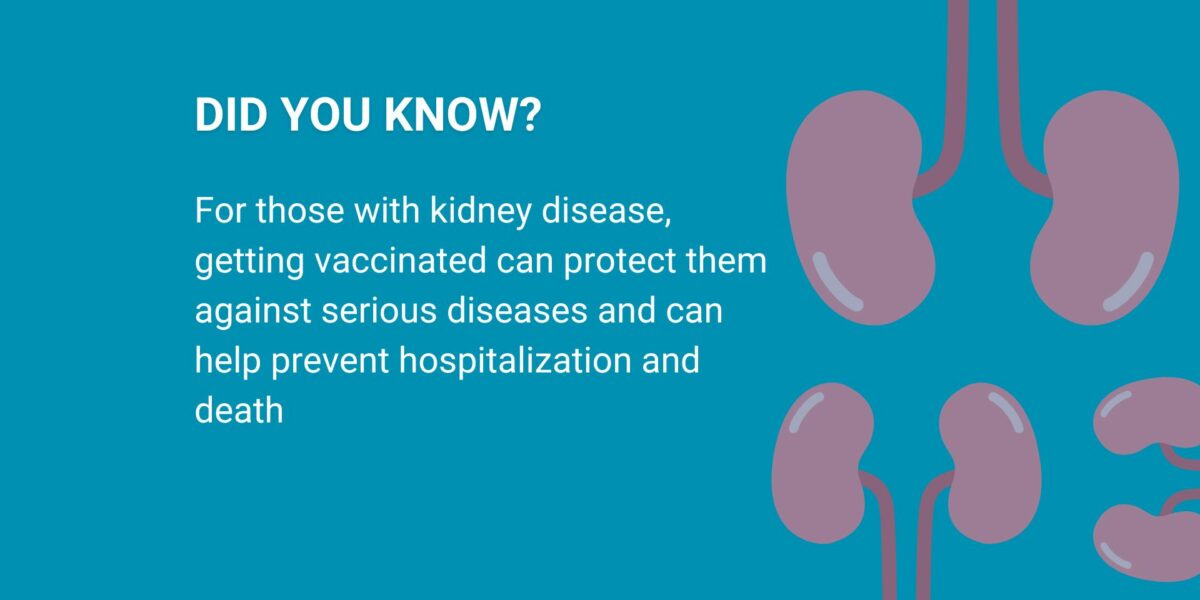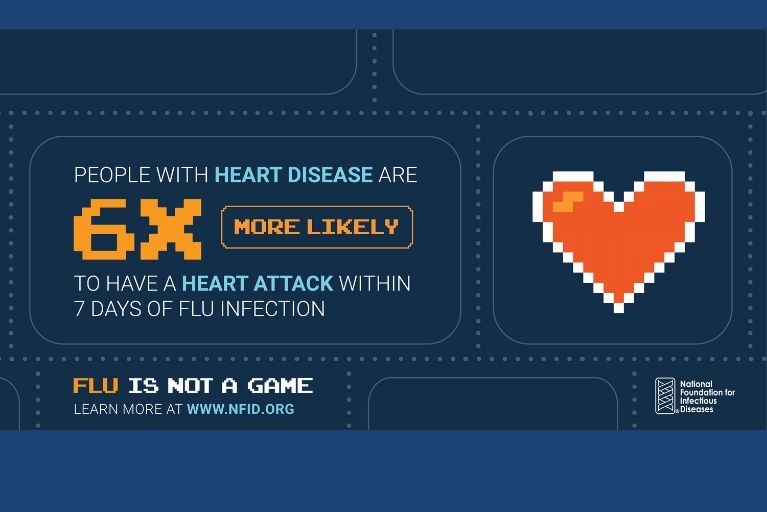
In honor of American Heart Month, the National Foundation for Infectious Diseases (NFID) and the American Heart Association (AHA) strongly encourage those with heart disease and other chronic health conditions to receive all recommended vaccines. 
This previously published post by Eduardo Sanchez, MD, MPH, Chief Medical Officer for Prevention at AHA, is still very relevant, as the US is experiencing the highest number of flu cases on record since the 2009 H1N1 (swine flu) pandemic. Sanchez is a nationally recognized expert on chronic and cardiovascular disease management.
Why is it important for people with heart disease or a history of stroke to receive all recommended vaccines?
Patients with a history of heart disease who contract influenza (flu) or COVID-19 have a greater likelihood of severe or even fatal outcomes, including a heart attack or stroke. There also is a strong correlation between RSV and heart health in more serious cases of RSV. This makes it critically important that those with heart disease or a history of stroke stay up to date on recommended vaccinations. Those who are in the preliminary stages of heart disease or are predisposed to developing heart disease or strokes may also be at greater risk for more severe complications and potentially fatal outcomes from preventable respiratory diseases.
The evidence continues to show that vaccines help prevent or lessen the effects of many diseases, and in those with heart disease or history of stroke, vaccines can save lives.
- People with COVID-19 are 3-8 times more likely to have a heart attack and 3-7 times more likely to have a stroke
- People with heart disease are 6 times more likely to have a heart attack within a week after flu infection
- Heart disease has been linked to 45-63% of adult hospitalizations for RSV
Beyond the benefits to the person receiving the vaccine, how do vaccines help family members and communities?
When you get vaccinated, you are not only protecting yourself from disease but also those around you. In general, getting vaccinated makes you less likely to spread disease to others, helping contribute to immunity for your community as a whole. This is extremely important because this protection is extended to those who may be unable to receive a vaccine for medical or other reasons.
What questions should patients with heart disease ask about recommended vaccinations?
Patients should talk with a trusted healthcare professional about which vaccines are recommended for them, as well as when and where they should receive them. They should also ask if there is any reason why they should not be vaccinated due to contraindications—for example, people who have had severe allergic reactions to vaccines or injectable therapies. Generally, vaccines are administered at pharmacies, workplaces, and primary care offices, but some cardiologists and other specialists may also offer certain vaccines.
What is your key message to healthcare professionals and to people with heart disease who are not currently vaccinated against preventable, potentially deadly diseases?
All healthcare professionals—regardless of their specialty—should encourage their patients to receive recommended vaccines to help protect both the individual patient and the community as a whole. We should not be leaving any opportunity to get vaccinated behind—ever. Vaccines are important, evidence-based interventions that help protect individual and population health, and patients should always be counseled regarding the benefits of vaccination and the importance of staying current on recommended vaccines. Hearing the benefits of vaccination directly from a healthcare professional absolutely nudges patients to take action and get vaccinated.
What resources are available to those looking to learn more about the connection between heart health and vaccination?
The American Heart Association website (www.heart.org) has many resources regarding the importance of vaccinations in patients with heart disease, including:
Patients and caregivers who have questions or concerns about vaccines should talk with a trusted healthcare professional.
To join the conversation and get the latest news on infectious diseases, follow NFID and AHA on X/Twitter, like NFID on Facebook, follow NFID on Instagram and Bluesky, visit NFID on LinkedIn, listen and subscribe to the Infectious IDeas podcast, and subscribe to receive future NFID Updates.
Related Posts

3 Things You Need to Know about Kidney Disease and Vaccines
It is important for people with kidney disease to understand how critical vaccination can be for their health and well-being

5 Reasons Why Vaccines Are Good for Your Heart
For people with heart disease, getting vaccinated is as important to staying healthy as diet and exercise

A Heart-Healthy Lifestyle Includes Vaccination
In the US, heart disease is a leading cause of death, causing one in four deaths. To help raise awareness about the importance of a heart-healthy lifestyle, American Heart Month is observed in the US each February, making it the perfect time for healthcare professionals to talk with at-risk patients about the need to stay up to date on all recommended vaccines …
